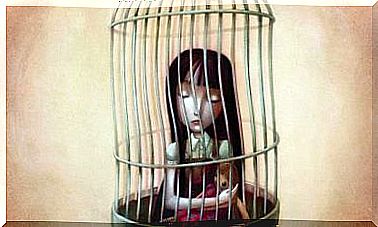Affective-emotional Disorder, Do You Know What It Is?

Affective-emotional disorder (SAD) is also known as seasonal affective disorder or winter depression (DI). Surely it sounds more familiar to us than we think, especially to those people who at certain times of the year become sad without knowing why. Do you want to know more about this disorder?
Affective-emotional disorder is a type of depression that is affected by the changes in brightness caused by each season. Normally, it starts in the months of October and November when daylight hours are reduced. With the arrival of spring these symptoms are appeased. What happen? That many times it happens the other way around and these symptoms occur during the summer.
What are the causes of affective-emotional disorder?
The causes of SAD are not yet clear. At the moment, we know that the consequence of feeling sad and discouraged is due to the few hours of light from which the seasonal change comes. If it is the opposite case, in summer, because their increase also causes us a change in our emotions that we do not know why it happens.

If we focus on our brain, experts believe that melatonin and serotonin (two hormones that help regulate the sleep, energy and mood cycle) may be responsible for us feeling more low than usual. Let’s see what symptoms affective-emotional disorder presents.
1. Changing mood
People with SAD suddenly have a low mood, they feel they are worthless. Ultimately, they have feelings of hopelessness. They get annoyed more often with anything, no matter how silly. All this is a consequence of his emotional state, which is more irritable and sensitive.
2. Inability to enjoy
Despite the fact that you enjoy something remarkably, when you present the affective-emotional disorder, everything that you enjoyed suddenly does not interest you because you do not enjoy it as before. You lose interest and are dissatisfied with many things and situations. This is often accompanied, many times, by guilt.
3. Energy descending
Have we sometimes felt tired for no reason? Why do we tend to sleep too much even without being tired? What happens to us? These are the questions people with SAD often ask themselves. The almost absence of energy, which suddenly tackles us, causes us one without reason to which we cannot find a cause or a solution.

4. Dietary changes
Among the dietary changes caused by this type of disorder include both a lack of appetite and the need to eat more. The latter can be enhanced by anxiety caused by sleep changes, lack of energy, passivity with which we are suddenly overwhelmed, etc.
5. Difficulty concentrating
This disorder can cause a decrease in school and work performance. Why does this happen? For lack of motivation. As we mentioned earlier, the lack of energy has a lot to do with it. It will cost us more to get up, everything will require an effort that we feel lacking in desire. To all this is added that lack of concentration that will make us think about other things or perhaps nothing.
6. Decrease in social activities
People with this disorder may spend less time away from home. They tend to shut up, to see their friends and family less. It is as if they closed in on themselves. They do not want to go out, to relax, to have fun, to do something, to feel active. This causes them frustration because at home they also do nothing, therefore, they see their life as meaningless .
How to solve it?
Although there are several ways to find a solution to this disorder, some people may help them, but others do not. To begin with, we must transmit these symptoms to our doctor to see how it can help us. The doctor will also be able to solve all those doubts that we may have.

He will surely recommend us to take advantage of daylight hours to exercise, force ourselves to have an active social life, eat well, establish a sleep routine, etc. These and other things are what we can do to deal with this type of disorder as best we can.
What can we do about affective-emotional disorder?
- Hours of sunlight appear to influence serotonin synthesis. Serotonin is known as the “happiness hormone”, so it will be important to take advantage of the daylight hours and expose ourselves a little to the sun. A meta-analysis by Gatón, González and Gaviria (2015) shows that the ideal when we enjoy fewer hours of sunlight is to expose ourselves to the sun for 15 to 20 minutes and increase it to 30.
- Physical exercise. Performing moderate physical exercise also influences the increase in serotonin production, so if we are not in the gym or we do not like to “beat ourselves up” too much, a good one hour walk at a brisk pace 4 to 5 days a week will suffice. .
- Maintain a healthy and balanced diet.
And you … do you suffer or have you known someone who has gone through this type of disorder? Do you think there is a better solution for affective-emotional disorder? We await your opinions!









